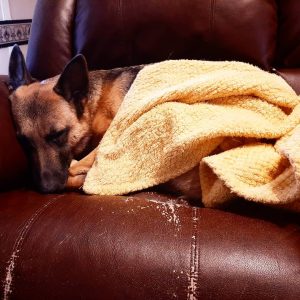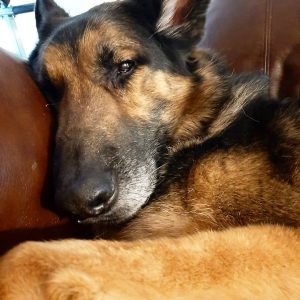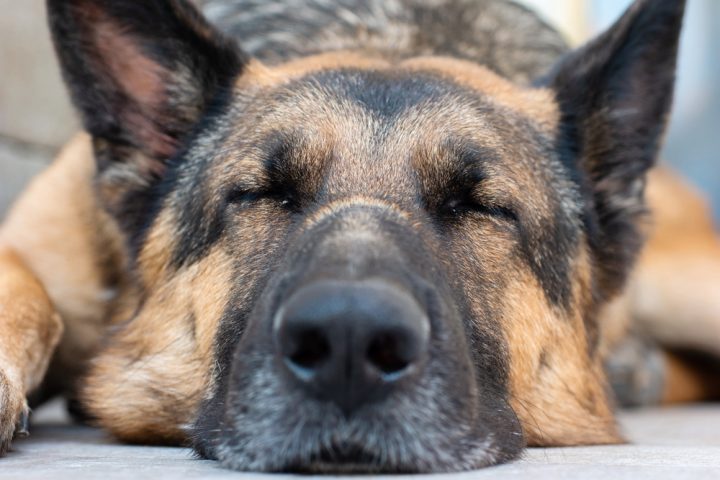German Shepherds are well known as being an active breed of dog, and their sleep requirements are often different than many other breeds of dogs due to their active lifestyle and their alertness and interest in monitoring everything that’s going on in their household.
But what are the sleep requirements of a German Shepherd and more specifically, how long do German Shepherds actually need to sleep?
As a working breed, German Shepherds generally need less sleep than non-working breeds. They average about 8 to 12 hours per day, based on their age, health, lifestyle, and individual needs. German Shepherd puppies and seniors may sleep more than adult German Shepherds, and those dogs who come from active working lines may sleep less.
Below we’ll dive into the details about how much a typical German Shepherd sleeps, and why that is. We’ll also discuss various factors that could impact your German Shepherd’s normal sleep schedule, as well as what to do if your pup sleeps too much or too little.
Finally, we’ll discuss the specific sleeping requirements for German Shepherd puppies and seniors, and how they differ from an adult German Shepherd’s sleep needs.
How Long Do German Shepherds Sleep?
Most dogs sleep about 30-50% of the day, with an average of about 10 to 12 hours. The German Shepherd, as a working dog, tends to sleep a little less than that.
The German Shepherd was bred to work for long periods of time and maintain activity (both physically and mentally) throughout the day and even throughout the night. This resulted in a healthy adult German Shepherd needing less sleep than other breeds of similar age and health.
While individual German Shepherds may sleep less or more than the average German Shepherd, most German Shepherds are fairly active and alert at all times of the day and you probably won’t catch them snoozing while on the job…even if that job is just hanging out at home!
My German Shepherds have adapted their sleep and wake schedule to my own. They sleep thoroughly at night (with the occasional alert barking if a wild animal strays too close to our house), and then they are up and awake for the course of the day.
I do see them nap here and there, but they are very obviously still awake and alert enough that if I said something or they heard something they would be up and fully awake in a matter of seconds.
As you can see below, they are quite happy to nap together!

As loyal protectors of their homes and families, most German Shepherds will follow similar sleep/wake cycles, but there are a few things that could affect how much a German Shepherd sleeps, with some being more concerning than others.
Things That May Affect Your German Shepherd’s Sleep Cycle
Illness Or Injury
German Shepherds who are feeling unwell may sleep more or less than their normal cycle. A dog in pain will likely sleep less as it is uncomfortable for them to relax, whereas a dog who is sick may sleep more while they are recovering.
If your German Shepherd is on any medications to help with their illness or injury, this may also cause them to sleep more than they normally do, especially if the medications have a sedating effect.
German Shepherds may also suffer from depression which can cause an increase in sleeping and disinterest in their normal activities.
Stress
It’s a well-known fact that German Shepherds can be prone to anxiety and stress if not properly socialized and trained from a young age, or if they are removed from their owners and normal routines.
This increase in stress can cause a reduction in their sleep hours or lead to a more restless sleep as the dogs are not able to enter into that deep sleep cycle due to the level of stress and anxiety they may be experiencing.
Diet
Just as with people, diet can have a big impact on your German Shepherd’s sleep cycle. If your pup’s daily food intake includes a lot of people’s food, low quality dog food, or foods that are not appropriate for their lifestyle (such as high-energy foods for a relatively sedentary dog), then you could see a change in your German Shepherd’s sleep cycle.
Certain foods may cause them to sleep more, whereas other foods may actually cause them to sleep less. Poor diet can also lead to additional health problems such as obesity and diabetes which can also impact your pup’s sleep schedule.
Feeding your German Shepherd too early or too late in the day could also cause disturbances in their sleep. Making sure to choose a routine feeding time that allows them to fully digest and process their food is important to avoid any nighttime energy spikes or bathroom trips.
Uncomfortable Sleeping Area
The area in which your German Shepherd sleeps may also impact their sleep habits. Dogs prefer safe, comfortable sleeping areas where they can fully relax. If they are not able to get that, they may sleep less or their sleep may be more restless than it should be.
Providing your German Shepherd with a comfortable bed and keeping the bed in an area that is away from the hustle and bustle of your household are two ways to ensure that your pup is getting the restful sleep that they need.
If your dog doesn’t have those things, or they are unable to get away from the noise and stimulation of the world around them, then their sleep may suffer.
Change To Routine
“Routine” is a German Shepherd’s middle name! While German Shepherds are considered a highly adaptable breed of dog and they can learn new routines fairly easily (this also makes them a great choice for first time dog owners), it does take a bit of time for them to adjust.
During that adjustment period when they are going from one routine to another, you may notice them sleeping less or sleeping at unusual times.
For example, if you suddenly switched from a day shift to a night shift, it might take a few weeks for your pup to learn your new routine and they’ll try to stick to their previous sleep/wake cycle until they’ve learned the new one.
Similarly, if you introduce a new member to the household that impacts their normal routine (such as the addition of a new baby or even a new puppy), you may also notice slight changes to your German Shepherd’s sleep schedule as they learn to navigate the changes in your life.
Just remember to be patient with your pup until they’ve adapted to the new sleep schedule!
Breeding
Interestingly, your German Shepherd’s genetics may also play a role in their sleep cycle. As I discussed at the beginning of this article, the German Shepherd is a working breed and thus they will almost always sleep less than non-working breeds.
The lineage of individual German Shepherds may further change how much or how little they sleep. German Shepherds that come from a long line of working dogs or who have been bred for herding, military, or police work may sleep even less than a German Shepherd who was bred for service dog work or just as a companion.
What Do I Do If My German Shepherd Sleeps Too Much?
If you feel like your German Shepherd is sleeping more than they should for their age, it’s best to schedule a vet visit to rule out any underlying health conditions or injuries.
If your pup is otherwise healthy, you may need to set up a more regular schedule for your dog and encourage them to engage in more activities throughout the day. Those activities can be more frequent play sessions, walks around the neighborhood, or providing them with enrichment through puzzle toys or obedience exercises to get their mind working.
Making sure your pup is getting the physical and mental exercise they need each day will help them stick to a more regular sleep cycle.
What Do I Do If My German Shepherd Doesn’t Sleep Enough?
Similar to the section above, a vet visit is still suggested as the first thing you do if your German Shepherd is not sleeping enough. If your vet has determined that your pup has no underlying conditions that are causing the sleeplessness, then you can look at additional things you can do to help your dog sleep.
Providing your German Shepherd with a more comfortable bed or sleeping location is the first step, as is looking at your own routine and if that may impact when and how long your dog sleeps. Relaxing music and calming pheromones or supplements may also help your German Shepherd relax a little more and sleep more deeply.
If all else fails, you can also speak to your vet about providing your dog with prescription medications that can help them sleep. German Shepherds who do not get enough restful sleep can become easily agitated, and too many sleepless nights can lead to additional health and behavioral issues.
How Long Do German Shepherd Puppies Need To Sleep?
German Shepherd puppies tend to need significantly more sleep than an adult German Shepherd, with many puppies sleeping almost 20 hours per day during their first few weeks of life.
As they age and enter into the adolescent period, their sleeping periods shorten, and they begin to learn routines and habits. During this stage, as the puppies have not yet learned how to adapt their own cycles to that of their owners and are still learning impulse control, many owners often report their puppy waking in the middle of the night if they become bored, hungry, or need attention in some way (just like human babies!).
As your German Shepherd puppy continues to age, these midnight adventures will lessen. The potty-training process, teething stage, and critical socialization period may also cause some interruptions in a puppy’s normal sleep cycle.
You might also find your puppy napping in some odd places as they learn where they feel the most comfortable (as Kenai did in the photo below, where she first discovered the recliner when she was a puppy!).

How Long Do Senior German Shepherds Need To Sleep?
On the other side of things, a senior German Shepherd also generally requires more sleep than younger dogs, and you will probably find them sleeping quite deeply throughout the day.
Underlying age-related health issues in a senior German Shepherd may also interrupt their normal sleep cycle, so they may need to rely on shorter and more frequent naps to get the rest their bodies and minds need.
My senior German Shepherd, Dante, enjoys his nap time, though he’s still quick to wake if disturbed (as you can see in the photo below though I tried my hardest to be quiet!).

Many senior dogs can suffer from insomnia at night, or general lack of comfort with laying in the same position for long periods of time, so they may get up and wander during the night or move around frequently to find a better sleeping position, all of which can disrupt their normal sleep cycle.
Orthopedic beds that provide your German Shepherd with more support can help with this restlessness, as can speaking with your vet about additional medications or supplements to make sure your four-legged friend is getting the rest they need.
Closing Thoughts
Most German Shepherds will sleep around 8 to 12 hours per day, though those with more active lifestyles may sleep less.
Underlying health issues may cause interruptions in your pup’s normal sleep cycle, as can age, stress, diet, changes in routine, and even the genetics of your individual German Shepherd.
Providing your pup with a safe and comfortable place to sleep will help encourage them to fully relax and get the rest their bodies require.

